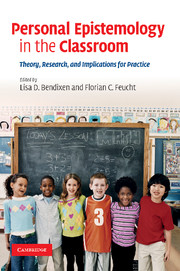Book contents
- Frontmatter
- Contents
- List of figures
- List of tables
- Contributors
- Part I Introduction
- Part II Frameworks and conceptual issues
- Part III Students' personal epistemology, its development, and its relation to learning
- Part IV Teachers' personal epistemology and its impact on classroom teaching
- 13 Epistemological resources and framing: a cognitive framework for helping teachers interpret and respond to their students' epistemologies
- 14 The effects of teachers' beliefs on elementary students' beliefs, motivation, and achievement in mathematics
- 15 Teachers' articulation of beliefs about teaching knowledge: conceptualizing a belief framework
- 16 Beyond epistemology: assessing teachers' epistemological and ontological worldviews
- Part V Conclusion
- Index
15 - Teachers' articulation of beliefs about teaching knowledge: conceptualizing a belief framework
Published online by Cambridge University Press: 04 May 2010
- Frontmatter
- Contents
- List of figures
- List of tables
- Contributors
- Part I Introduction
- Part II Frameworks and conceptual issues
- Part III Students' personal epistemology, its development, and its relation to learning
- Part IV Teachers' personal epistemology and its impact on classroom teaching
- 13 Epistemological resources and framing: a cognitive framework for helping teachers interpret and respond to their students' epistemologies
- 14 The effects of teachers' beliefs on elementary students' beliefs, motivation, and achievement in mathematics
- 15 Teachers' articulation of beliefs about teaching knowledge: conceptualizing a belief framework
- 16 Beyond epistemology: assessing teachers' epistemological and ontological worldviews
- Part V Conclusion
- Index
Summary
Teaching is doing whatever it takes to help students learn concepts, patterns, and systems. It is to be knowledgeable about: methods, instruction, curriculum. And using that knowledge to guide students to become inquisitive, active members of learning communities.
(ID 421, practicing teacher)The remarks above describe one teacher's perspective on teaching. An examination of this quote garners insights and inferences regarding the practices this teacher may use in her classroom. The perspective that teaching requires doing “whatever it takes,” knowledge about a variety of topics, and the ability to use knowledge in multiple ways and settings, suggests that teaching is a very complex task. Thus, the beliefs that underscore this perspective on teaching must be equally complex. In this chapter we explore how preservice and practicing teachers articulate their beliefs about teaching knowledge. By teaching knowledge we mean any knowledge used to facilitate the practice of teaching.
Researchers and teacher educators have explored and examined teachers’ beliefs for decades (Pajares, 1992; Kagan, 1992). Teachers’ beliefs have been examined relative to a number of topics or constructs including motivation (e.g., Stipek et al., 2001), adolescent development (e.g., Buchanan et al., 1990), developmental skills and play (e.g., Kemple, 1996; Kowalski et al., 2001), constructivism (e.g., Holt-Reynolds, 2000; McLachlan-Smith and St-George, 2000), instructional practices (e.g., Borko et al., 2000; Lawless and Smith, 1997; Sahin et al., 2002), classroom management and control beliefs (e.g., Weinstein, 1998), diversity (e.g., McAllister and Irvine, 2002; Pohan, 1996), bilingual education (Flores, 2001; Johnson, 2000), special education (e.g., Jordan and Stanovich, 2003; Mantzicopoulos and Neuharth-Prichett, 1998) and and urban education (Roderick, 1994 ).
- Type
- Chapter
- Information
- Personal Epistemology in the ClassroomTheory, Research, and Implications for Practice, pp. 470 - 515Publisher: Cambridge University PressPrint publication year: 2010
- 11
- Cited by



